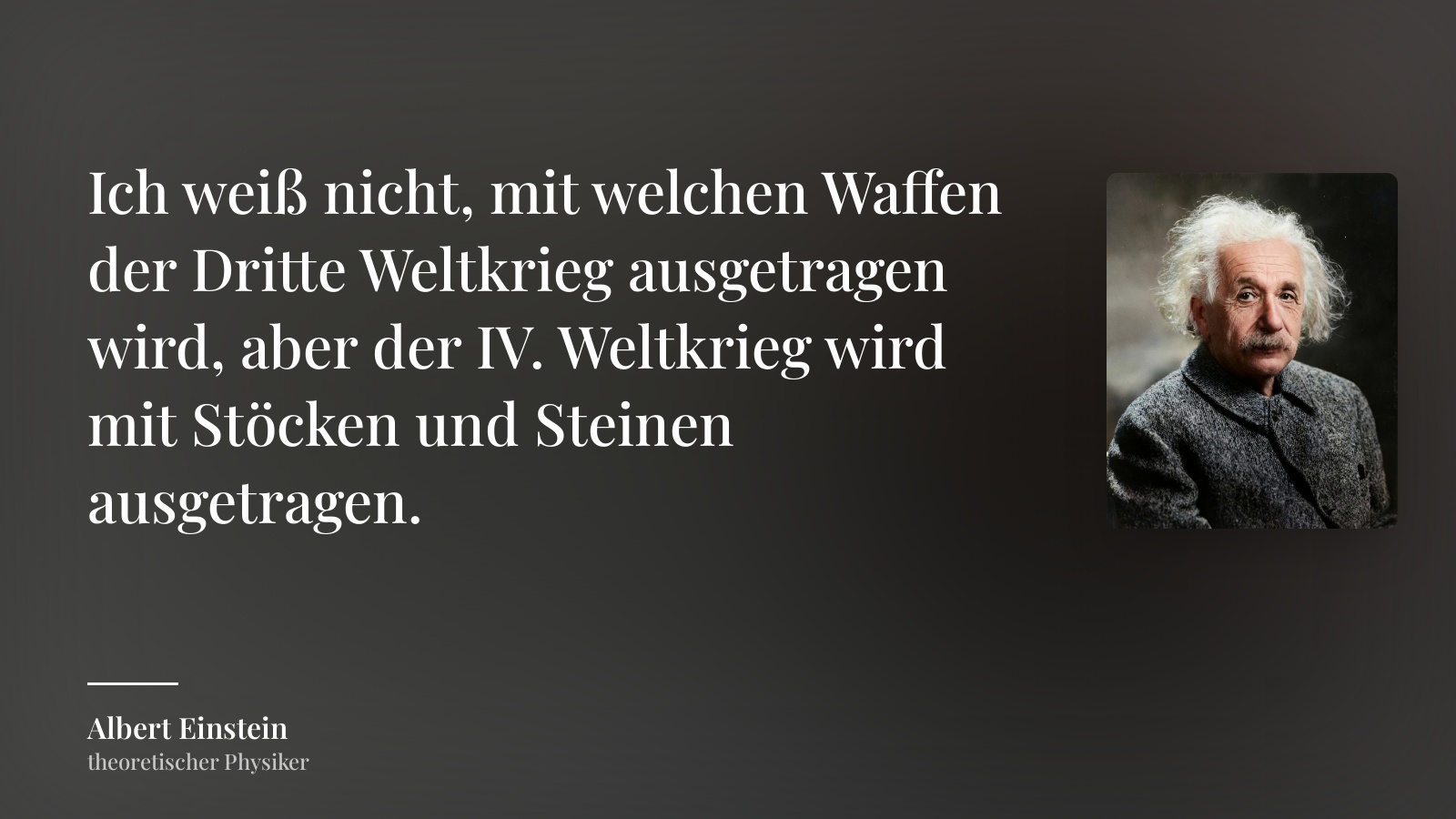„Ich weiß nicht, mit welchen Waffen der Dritte Weltkrieg ausgetragen wird, aber der IV. Weltkrieg wird mit Stöcken und Steinen ausgetragen.“
Original
I know not with what weapons World War III will be fought, but World War IV will be fought with sticks and stones.
Interview with Alfred Werner, Liberal Judaism 16 (April-May 1949), Einstein Archive 30-1104, as sourced in The New Quotable Einstein by Alice Calaprice (2005), p. 173
Differing versions of such a statement are attributed to conversations as early as 1948 (e.g. The Rotarian, 72 (6), June 1948, p. 9 http://books.google.com/books?id=0UMEAAAAMBAJ&pg=PA9: "I don't know. But I can tell you what they'll use in the fourth. They'll use rocks!"). Another variant ("I do not know with what weapons World War III will be fought, but World War IV will be fought with sticks and stones") is attributed to an unidentified letter to Harry S. Truman in "The culture of Einstein" by Alex Johnson http://www.msnbc.msn.com/id/7406337/, MSNBC, (18 April 2005). However, prior to 1948 very similar quotes were attributed in various articles to an unnamed army lieutenant, as discussed at Quote Investigator : "The Futuristic Weapons of WW3 Are Unknown, But WW4 Will Be Fought With Stones and Spears" http://quoteinvestigator.com/2010/06/16/future-weapons/#more-679. The earliest found was from “Quote and Unquote: Raising ‘Alarmist’ Cry Brings a Winchell Reply” by Walter Winchell, in the Wisconsin State Journal (23 September 1946), p. 6, Col. 3. In this article Winchell wrote: <blockquote> Joe Laitin reports that reporters at Bikini were questioning an army lieutenant about what weapons would be used in the next war. “I dunno,” he said, “but in the war after the next war, sure as Hell, they’ll be using spears!” </blockquote>
: It seems plausible, therefore, that Einstein may have been quoting or paraphrasing an expression which he had heard or read elsewhere.
1940s
Variante: I know not with what weapons World War III will be fought, but World War IV will be fought with sticks and stones.

Ähnliche Zitate

Die neuen Herrscher der Welt. Ziegler, 2003, S. 104
Theodor Haecker, Tag- und Nachtbücher 1939-1945. Hrg. von Heinrich Wild. München: Kösel, 1947. S. 51

Tag- und Nachtbücher 1939-1945. Hrg. von Heinrich Wild. München: Kösel, 1947. S. 51

"Welt am Sonntag", 23. Oktober 1994

Friedrich Engels: 'Der magyarische Kampf'. in: Neue Rheinische Zeitung Nr. 194 vom 13. Januar 1849. http://www.ml-werke.de/marxengels/me06_165.htm

Zu einem möglichen Einsatz deutscher Truppen in Bosnien, taz, 30. Dezember 1994

zitiert in Hellmuth Karasek: Billy Wilder - Eine Nahaufnahme, Hoffmann und Campe, 1992. S. 399. Vorabdruck in DER SPIEGEL 3. August 1992 http://www.spiegel.de/spiegel/print/d-13680344.html
"My god, I think there have been more books on Marilyn Monroe than on World War II, and there's a great similarity. It was not easy. It was hell. But it was well worth it once you got it on the screen." - Dialogue on Film; Billy Wilder and I.A.L. Diamond. The American Film Institute/1976. In: Billy Wilder Interviews, edited by Robert Horton. University Press of Mississippi. p. 113 books.google http://books.google.de/books?id=OCAKjmrTZo8C&pg=PA113

Kyffhäusertreffen der AfD am 2. September 2017 BuzzFeed https://www.buzzfeed.com/de/marcusengert/afd-spitzenkandidat-gauland-findet-deutsche-sollten-stolz?utm_term=.gsmjPjWm9#.fenMxMJa5

